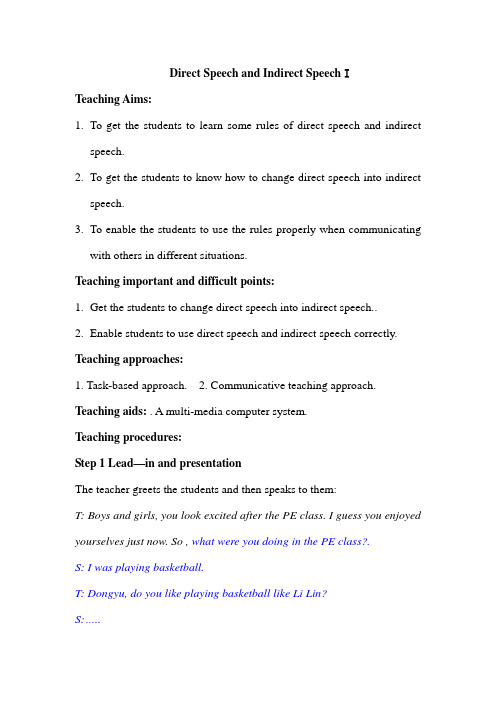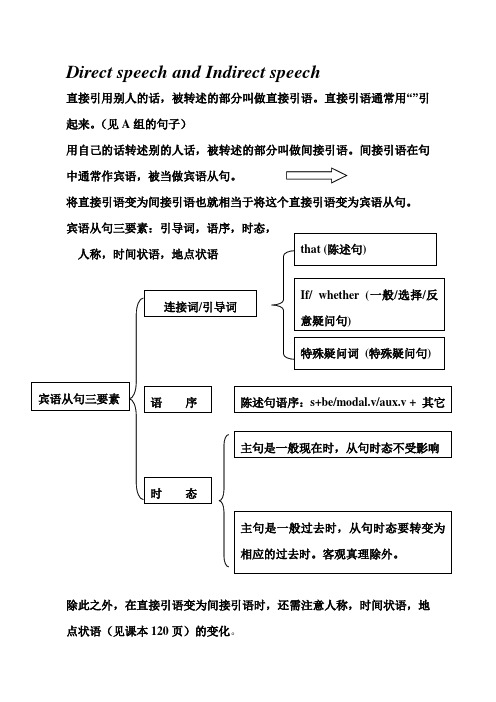IMPORTANT Direct and indirect speech
Direct Speech and Indirect Speech I

Direct Speech and Indirect Speech ITeaching Aims:1.To get the students to learn some rules of direct speech and indirectspeech.2.To get the students to know how to change direct speech into indirectspeech.3.To enable the students to use the rules properly when communicatingwith others in different situations.Teaching important and difficult points:1.Get the students to change direct speech into indirect speech..2.Enable students to use direct speech and indirect speech correctly. Teaching approaches:1. Task-based approach.2. Communicative teaching approach. Teaching aids: . A multi-media computer system.Teaching procedures:Step 1 Lead—in and presentationThe teacher greets the students and then speaks to them:T: Boys and girls, you look excited after the PE class. I guess you enjoyed yourselves just now. So , what were you doing in the PE class?.S: I was playing basketball.T: Dongyu, do you like playing basketball like Li Lin?S:…..T: I like volleyball best.Write the sentences on the blackboard while talking with students:1.The teacher asked, “What were you doing in PE class?”2.The student said, “I was playing basketball.”3.The teacher asked,“Do you like playing basketball like Li Lin?”Then the teacher repeated the conversation with indirect speech and asked Ss what the difference is among them.Then, draw a conclusion:直接引语: (direct speech)直接引用别人的话, 把它放在引号内。
Grammar-Direct and Indirect Speech (2)

B.一般过去时的句子中含有表示具体时间的状语时, 时态可不变.
e.g. She said,” I was born in 1983.” She said that she was born in 1983.
2. 人称的变化
“一主二宾三不变”
3.指示代词,时间状语,地点状语和动词的变化
代词
this---that these-those next-the next ago-before yesterday-the day before tomorrow-the next day here- there come-go
祈使句(imperatives)
Keep quiet. Help me with my homework. Take off your shoes. Tell me your true feelings.
Please keep quiet.
Could you please help me with my homework? Can you take off your shoes? Will you tell me your true feelings? requests ask sb to do sth
A.当从句中内容为客观真理时: e.g. He said,” A friend in need is a friend indeed.” He said that a friend in need is a friend indeed. e.g. He said,” Light travels much faster than sound.” He said that light travels much faster than sound.
Direct speech and Indirect speech

2. We said to her, “They’re cleaning the room.”
he had walked a long way. Mr. Black said that __
2.时态变化
直接引语变间接引语时,间接引语的时态 要与主句的时态一致。
1. 主句为一般现在时, 现在完成时或一般将
疑问句变为间接引语时, 除了 要把疑问语序改为陈述语序, 由whether/if 或特殊疑问词引 导外, 人称、时态和状语等也 要作相应地变化。
祈使句的间接引语 —— 采用 “动词 + 宾语 + 不定式” 结构: told / asked / ordered sb. (not) to do sth.
3. “Don’t play with fire, little boy,” his grandfather said. His grandfather told the little boy →_____________________________ not to play with fire _________________.
1. 人称的变化
直接引语里的第一人称和第二人称,变间
接引语时,人称要做相应调整。
1. She said, “I am hungry.”
She said she was hungry. Mum told me that I could do it myself.
2. Mum said to me, “You can do it yourself.”
suggest doing / suggest that sb.
(should) do ... 或 advise sb. to do /
Direct speech and Indirect speech

Direct speech and Indirect speech直接引用别人的话,被转述的部分叫做直接引语。
直接引语通常用“”引起来。
(见A组的句子)用自己的话转述别的人话,被转述的部分叫做间接引语。
间接引语在句中通常作宾语,被当做宾语从句。
将直接引语变为间接引语也就相当于将这个直接引语变为宾语从句。
除此之外,在直接引语变为间接引语时,还需注意人称,时间状语,地点状语(见课本120页)的变化。
直接引语转变为间接引语人称代词转换规律:一从主,二从宾,三不变说明:“一从主”指“直接引语”的主语为一人称时,从句的主语随主句的主语。
“二从宾”指“直接引语”的主语为二人称时,从句的主语随主句的宾语。
“三不变”指“直接引语”的主语为三人称时,从句的主语不变。
Eg: 1, He said : “ I can help them.”He said (that) he could help them.2, He said to Lily: “ Y ou can help them”.He said to Lily (that) she could help them.3, He said to Tom: “ They can help these patients”.He said to Tom (that ) they could help these patients.祈使句变间接引语规律:一改,二变,三加,四去说明:“一改”指改主句的为主动词。
Say 常变为order, ask, beg, tell 等能带复合/双宾语(物为直接宾语DO,人为间接宾语IO)的词。
“二变”指变呼语为间接宾语。
“三加”指加上不定式符号to“四去”指去掉pleaseEg: He said to Tom: “come here,please”.He asked Tom to go there.。
直接引语和间接引语作文例子英语

直接引语和间接引语作文例子英语Direct and Indirect SpeechDirect and indirect speech are two ways of reporting what someone has said. There are specific rules for each type of speech, and it is important to understand the differences between them.Direct speech is when you report someone's words exactly as they were spoken. For example:Direct speech: "I am going to the store," said John.In this sentence, the exact words spoken by John are enclosed in quotation marks.Indirect speech, on the other hand, is when you report someone's words without quoting them directly. Instead, you convey the meaning of what was said in your own words. For example:Indirect speech: John said that he was going to the store.In this sentence, the words spoken by John are not enclosed in quotation marks. Instead, the meaning of his words is conveyed indirectly.There are several rules to keep in mind when using direct and indirect speech.In direct speech:- The exact words spoken by the person must be enclosed in quotation marks.- The reporting verb is usually in the present tense, even if the original statement was made in the past.- Pronouns and verb tenses must be changed to agree with the context of the reporting verb.In indirect speech:- The reporting verb is usually in the past tense.- The pronouns, time expressions, and verb tenses may need to be changed to agree with the reporting verb.- Quotation marks are not used.Here are some more examples to illustrate the differences between direct and indirect speech:Direct speech: "I love chocolate," she said.Indirect speech: She said that she loved chocolate.Direct speech: "I will call you later," he said.Indirect speech: He said that he would call later.Direct speech: "We are going to the beach tomorrow," they said.Indirect speech: They said that they were going to the beach the next day.Direct and indirect speech are important tools in writing and communication. By understanding the rules for each type of speech, you can effectively report what someone has said and improve your overall writing skills. Practice using both direct and indirect speech in your writing to become more proficient in conveying the words of others.。
英文学术引用Direct and Indirect Speech

• Argue to prove why you believe what you believe. Here you create the argument, by extension, This is the largest portion of your paper.
3
3. Conclusion • Summarizes the main idea using different words • May call the reader to action • Does not introduce any totally new ideas • Concludes the entire paper ideally in 1-paragraph.
Needed to Publish an Article:
China:
• Pay more attention to the qualifications of the scholar.
• They wish to see the author’s: • CV, • Year of birth • Research interests • Affiliations • Address • Telephone Number, • Email Address • Etc.
**The Conclusion paragraph reminds the reader about everything that was discussed in the essay. This paragraph tells the reader briefly the details about what was discussed in the essay as well as the author's opinion on the subject.
Direct-and-Indirect-Speech
Grammar:Direct and Indirect Speech(直接引语和间接引语)Direct and Indirect SpeechI.句式情况1。
转述他人的陈述→陈述句He said ,“I’m going to Beijing。
"→He said that he was going to Beijing。
2. 转述他人的疑问→一般疑问句He asked, “Are you a teacher?”→He asked me if /whether I was a doctor。
3. 转述他人的问题→特殊疑问句She said ,“What are you doing?”→She asked me what I was doing。
直接引语变成间接引语,句子结构的变化1。
陈述句:用连词that引导,that在口语中常省略。
主句的谓语动词可直接用引语中的said,也可用told来代替,注意,可以说said that,said to sb。
that,told sb。
that,不可直接说told that1)He said,“I ha ve been to the Great Wall。
"→He said to us that he had been to the Great Wall。
2)He said, “I'll give you an examination next Monday。
”→He told us that he would give us an examination the next Monday.3)“I don't like computers," Sarah said to her friends→Sarah said to her friends that she didn’t like computers。
2. 一般疑问句: 间接引语用连词whether或if引导,原主句中谓语动词said要改为asked(me/him/us等),语序是陈述句的语序1)He said,“Do you have any difficulty with pronunciation?"→He asked (me) whether/if I had any difficulty with my pronunciation。
Direct and Indirect Speech - Pearson Education
D IRECT AND I NDIRECT S PEECHWhen the actual words of the speaker are reproduced, it is called direct speech. Example:He said, ‘I am going to school.’When the main idea of a speaker’s words is reported by another person and the exact words are not quoted, it is called indirect speech or reported speech. Example:He said that he was going to school.•Quotation marks or ‘inverted commas’ are used for direct speech.Example:‘I have cut my finger!’ cried Mrs Sharma.•Quotation marks are not used for indirect or reported speech.Example:Mrs Sharma cried that she had cut her finger.•Question marks and exclamation marks are not used in reported speech.Examples:‘Is it bleeding very much?’ Mr Sharma asked. (direct)Mr Sharma asked if it was bleeding very much. (indirect)•In reported speech, the reporting verbs like asked/enquired, commanded/ ordered/requested, advised/suggested, exclaimed/shouted, etc are often used in place of the reporting verb ‘said’ to convey the mood of the spoken words.Examples:Ramesh said, ‘How hot the soup is!’ (direct)Ramesh exclaimed that the soup was hot. (indirect)‘Stir it with your spoon,’ his sister said. (direct)His sister advised him to stir it with a spoon. (indirect)The son said to his mother, ‘I shall never be rude to you.’ (direct)The son promised his mother that he would never be rude to her.(indirect)‘Why has the clock stopped?’ thought Peter. (direct)Peter wondered why the clock had stopped. (indirect)•The tense of the verb in the reported speech is in the past tense. However, if the verb in the reported speech is stating a universal truth, a habit, a constant situation, the tense of that verb does not change:Examples:The boy said, ‘I brush my teeth every day.’ (simple present tense)The boy said that he brushes his teeth every day. (simple presenttense)The teacher said, ‘The Sun rises in the east.’ (direct)The teacher said that the Sun rises in the east. (indirect)She said, ‘My son wants to be an actor.’ (direct)She said that her son wants to be an actor. (indirect)•In an indirect or reported question, the subject comes before the verb, not after it. You do not use the helping verb ‘do’ to form reported questions.Example:Paul said, ‘What time does the bus come?’ (direct)Paul asked what time the bus came. (indirect)Sarah said, ‘When does the show begin.’ (direct)Sarah asked when the show began. (indirect)•The pronouns are also changed in reported speech.Pronouns of the first person are changed as below:Examples:He said, ‘I am bored.’ (direct)He said that he was bored. (indirect)Mira said, ‘We are going to the movies.’ (direct)Mira said that they were going to the movies. (indirect)Rinki said, ‘My friends gave me a treat.’ (direct)Rinki said that her friends gave her a treat. (indirect) Pronouns of the second person are changed as below:Examples:He said to her, ‘You are beautiful.’ (direct)He said to her that she was beautiful. (indirect)‘You must write neatly,’ the teacher told her pupils. (direct)The teacher advised her pupils that they must write neatly.(indirect) Pronouns of the third person do not change:Examples:I said, ‘They have gone out.’ (direct)I informed that they had gone out. (indirect)Leela said, ‘These books are theirs.’ (direct)Leela said that those books were theirs. (indirect)•While converting direct speech into indirect speech, the tense of the verb must change accordingly:Direct speech Indirect speechSimple present—Simple pastSimple past—Past perfectPresent continuous—Past continuousPresent perfect—Past perfectCan—CouldShall—WouldWill—WouldMay—MightExamples:She said, ‘I may attend the meeting.’ (direct)She said that she might attend the meeting. (indirect)Renu said, ‘I have finished my homework.’ (direct)Renu said that she had finished her work. (indirect)•Words indicating ‘nearness’ of time and place are changed to words indicating ‘distance’ of time and place:Direct speech Indirect speechThis—thatThese—thoseHere—thereNow—thenToday—that dayTomorrow—the next/following dayYesterday—the day before/the previous day Examples:The interviewer said to the young man, ‘We will let you know our decision by tomorrow.’ (direct)The interviewer said to the young man that they would let himknow their decision by the next day. (indirect)‘These are the documents you will require,’ the travel agentinformed the tourist. (direct)The travel agent informed the tourist that those were thedocuments she would require. (indirect)•When reporting a question, an order or a request, the connector ‘that’ is not used.Examples:The girl said, ‘May I come in?’ (direct)The girl asked if she could come in. (indirect)‘Pay your taxes,’ the king ordered his subjects. (direct)The king ordered his subjects to pay their taxes. (indirect)•In reported speech, the word/words or the sound used by the speaker to express an emotion is omitted.Examples:‘Wow! What a handsome man he is!’ the girls said. (direct)The girls exclaimed what a handsome man he was. (indirect)‘Hello!’ my friend said to me. ‘How are you?’ (direct)My friend greeted me and asked how I was. (indirect)W ORKSHEET 17I.Change the following sentences from direct to indirect speech.a)‘Congratulations! You have come first in the exams,’ the principal said tome.b)Mohit’s father said, ‘We must not watch TV while having our dinner.’c)‘What an expensive car he drives!’ remarked Rahul’s neighbour.d)‘How well you speak German,’ his teammate remarked.e)‘Hurry up!’ said Viru’s mother. ‘The bus will be here in a minute.’f)The policeman ordered the truck driver, ‘Show your licence.’g)‘You will have to surrender your passport,’ the officer said to the passenger.h)My grandfather said, ‘May you have a long life!’i)Mr Jain said to his colleague, ‘Will you please drop me at the airport?’j)‘Light travels in a straight line,’ the teacher explained.k)‘I saw an interesting film last evening,’ said my friend.l)The caller asked, ‘May I speak with Shweta?’m)‘May I know who is on the line?’ her father enquired.n)‘Ouch! The bee stung me!’ the child said.II.Read the following dialogues and fill in the blanks.a)Husband — Did you talk to Dr Trehan?Wife — Yes, but it is important for you to rest.Husband — What is it?Wife — Silence.Husband — Is it one or two?Wife — No.Husband — Is it three or four?Wife — YesTushar was admitted in a hospital with a complaint of tumour. He was resting.A few minutes later, he opened his eyes and asked his wife i) ____________ sheii) ____________. He asked her if it was one or two. She iii) ____________.Finally, he wanted to know if it iv) ____________ and she agreed with him.b)Sahil:I have invited four of my friends for dinner today.Radhika:Then I’ll invite my friends also.Sahil:That will be a good idea.Radhika:So, what should we have for dinner?Sahil:Let us decide the menu now.Sahil told Radhika that i) ____________. Then Radhika said ii) ____________, which Sahil thought iii) ____________. When Radhika asked iv) ____________ Sahil replied v) ____________.c)Principal:Where is your mother?Rhea:I have no mother. She died five years back.Principal:Who was the lady with whom you came in?Rhea:She is a stranger. She brought me for a treat.Principal:You should not accept food from a stranger.The Principal asked Rhea i) ____________. Puzzled, the girl told the principal ii) ____________ back. At this the principal asked her iii) ____________ had come in. Rhea replied that she was a stranger who iv) ____________. Then principal told Rhea v) ____________.d)Maggie:Tom, how much money did you give for the rabbits.Tom:Five shillings and six pence.Maggie:I think I’ve got more than that in my box upstairs. I’ll ask mother to give it to you.Tom:What for? I don’t want your money. I’ve got far more money.Maggie:I want to buy some more rabbits.Maggie asked Tom i) ____________. Tom replied promptly ii) ____________. Maggie told him iii) ____________ she would ask mother to give that money to him. Tom said iv) ____________. Maggie told him that v) ____________.e)Doctor:Hello, How are you feeling now?Patient:I am much better, sir.Doctor:Are you not fully well? Don’t you take proper rest?Patient:I am not fully well as I cannot have proper rest because of the busy schedule.Doctor:Take some tonic to regain your health, ok?The doctor asked i) ____________ the patient replied ii) ____________ the doctor asked iii) ____________ the patient replied iv) ____________ Finally, the doctor advised the patient v) ____________.f)Read the dialogues between the two girls and fill in the blanks.Gina:Why do you look so worried?Madhu:I have not prepared well for the exams. I have read only general articles.Gina:Don’t worry. There will be no questions from MCB. Reading general articles from magazines or newspapers will help youdevelop reading skills.Madhu:Thank you, I am very relieved. Thank you indeed.Gina asked Madhu i) _____________. Madhu told with concern that ii) _____________ and that she had read only general articles. Gina assured her not to worry as iii) _____________. Madhu looked relieved at Gina’s assurance and thanked her for her consoling words.。
英语中的直接引语和间接引语
Direct and Indirect Speech in EnglishDirect and indirect speech are essential components of effective communication in English. Direct speech refers to the precise, word-for-word quotation of someone's words, while indirect speech is a paraphrased version of what was said. Both forms have their own rules and usage in English grammar.Direct speech is commonly used in storytelling, reporting, and dialogues. In this form, the speaker's exact words are put within quotation marks. For example, if someone says, "I am going to the park," in a narrative, it would be written as, "I am going to the park," he said. Direct speech allows the reader or listener to experience the words as they were originally spoken, adding authenticity and veracity to the narrative.However, direct speech can sometimes be inappropriate or ineffective, depending on the situation. In such cases, indirect speech is preferred. Indirect speech involves the use of verb tense changes, pronoun changes, and other modifications to convey the meaning of the original statement while removing the exact words and speech marks. For example, "I am going to the park," he said, can be rewritten in indirect speech as, he said that he was going to the park. This form is commonly used in news reporting or when summarizing conversations.There are specific rules for transforming direct speech into indirect speech. When changing from present tense to past tense, the verb tense in the reported speech should be modified accordingly. For example, "I am going to the party tonight," she said, would be written in indirect speech as, she said that she was going to the party that night. If the original sentence is in the present continuous tense, it should be changed to past continuous tense in indirect speech. Additionally, words indicating time and place in the original sentence should also be modified in indirect speech.Pronouns in direct speech also need to be changed in indirect speech in accordance with the grammatical subject of the reporting clause. For example, "I am excited about the trip," Tom said. In indirect speech, it would become, Tom said that he was excited about the trip. In cases where the reported speech is in the first person, the pronoun should be changed to the third person in indirect speech.Quotation marks are not used in indirect speech, as the reported words are paraphrased and not quoted directly. However, words expressing emotion or special emphasis can still be placed in quote marks to preserve their impact. For example, "I can't believe it!" she exclaimed. In indirect speech, it would become, she exclaimed with astonishment that she couldn't believe it!In conclusion, direct and indirect speech play vital roles in English communication. Direct speech allows for the precise quotation of someone's words, while indirect speech is a paraphrased version of what was said. Both forms have specific rules regarding verb tense and pronoun changes to convey the original meaning accurately.Understanding and utilizing direct and indirect speech effectively enhances clarity and coherence in English speaking and writing.。
direct speech and indirect speech
直接引语间接引语引述别人的原话叫直接引语,用自己的话转述别人的话叫间接引语。
( I ) 直接引语转变为间接引语时,时间状语一般要作一定的改变。
常见的有:now→then; today→that day; tomorrow→tomorrow / the next day;next week→next week / the next week; ago→before; yesterday →the day before; yesterday afternoon →the afternoon before等。
如:He said,“ I will call you tomorrow.”He said he would call me tomorrow / the next day.(II) 从直接引语变为间接引语,陈述句用that引导,例如:He said “I don‟t want to go with her.”→He said that he did not want to go with her.III. 间接疑问句(Indirect Questions)疑问句的间接引语,叫做间接疑问句。
可分为两个类型。
I) 一般疑问句、选择疑问句和附加疑问句变为间接引语时要用从属连词whether 或if 来引导。
1.一般疑问句的间接引语,由whether 或if 引导:He asked me, "Is the boy your brother / Will you go with me?"→He asked me whether / if the boy was my brother / I would go with him.2. 选择疑问句间接引语,由whether 引导:"Do you study English or Japanese?" the girl asked Tom.→The girl asked Tom whether he studied English or Japanese.II) 特殊疑问句的间接引语,由疑问词引导。
- 1、下载文档前请自行甄别文档内容的完整性,平台不提供额外的编辑、内容补充、找答案等附加服务。
- 2、"仅部分预览"的文档,不可在线预览部分如存在完整性等问题,可反馈申请退款(可完整预览的文档不适用该条件!)。
- 3、如文档侵犯您的权益,请联系客服反馈,我们会尽快为您处理(人工客服工作时间:9:00-18:30)。
said her brother wanted to go shopping with her.
The boy said ,” I’m reading a book.”
Direct speech 直接引语 The boy said (that) he was reading a book.
口诀 说明
引号内的第一人 称变间引后与主 句主语的人称保 持一致 引号内的第二人 称变间引后与主 句宾语的人称保 持一致
直接引语
间接引语
一 随 主
二 随 宾 三 不 变
She said,“ I like She said that she liked tennis Tennis.” He said to Lily, He told Lily that “ you must get she must get up up early” early
“第三人称不更新”是指直接引语变间 接引语时。如果从句中的主语及宾语是 第三人称或被第三人称所修饰从句中的 人称一般不需要变化如: Mr. Smith said, “Jack is a good boy.” →Mr. Smith said Jack was a good boy.
Practice:
3)My teacher said, „„ she is a good student. ‟‟ she My teacher said ____was a good student 4) He said to me,“ I‟ve left her book in your he her room” my He told me that ___had left ___ book in ___ room.
tomorrow
next …
The next/following day
The next/following …
记住:指示代词、时间状语、地点状语和
动词的变化
直接引语 间接引语
指示代词
时间状语
this, these
now today yesterday tomorrow this week next week... here
I can speak three languages.
What did he say?
He said he could speak three languages.
I am mad at Marcia.
He said he was mad at Marcia.
What did he say?
We are having a party for Lana.
现在完成时
一般过去时 过去完成时
一般将来时
过去将来时
直接引语中的时间状语转换规则:
now today tonight ago yesterday last night then That day That night Before/earlier The day before The night before
2.一般疑问句直接引语变间接引语
Do you have math? ( They asked him )
you have math
注:
如果主句是一般现在时,直接引语变 间接引语时,从句的时态不变。 He says, “I’m not good at math. ” He says that he is not good at math.
注意: (1)如果在当天转述today,yesterday, tomorrow 等 时间状语也不必改变。 (2)如果在当地转述,here 不必改为there,动词 come 不必改为go. (3)当转述客观真理时,直接引语变为间接引语时, 时态不变。如: 1.He said , “The moon moves around the earth He said that the moon moves around the earth (4)为了表示引述的状态和情况到现在仍然是事实时 也经常用一般现在时。 My teacher said, “Tom is a good student. ” My teacher said Tom is a good student.
What did they say? They said they were having a party for Lana.
I am hardworking. I am not lazy.
What she did she say? She said was hard-working, What did shewas say? She said she not lazy.
I’m good at playing basketball.
good at playing He said What didhe hewas say?
basketball.
I am good at English. I do well in do well in English. She said good at English. What did she she was say? What did she say? She said she did well in English.
that, those
then that day the day before the next day that week... the next week
地点状语 动词
there go
come
this now yesterday tomorrow this week
that
these
those
What did he say? He said he___________________________. went to beach every Sunday
I go to beach every Sunday.
What did she say? She said she_________________________. would call me tomorrow
I will call you tomorrow.
“What are you doing?”
She asked me
what
I was doing.
“Why do you like English?”
He asked me
why
I liked English
“Where does he live?”
She said to me , She told me that 引号内的第三人 称在变间引后去人 “ They want to That they wanted help him” help him 称不变
直接引语时态
间接引语时态
一般现在时 现在进行时
一般过去时 过去进行时 过去完成时 过去完成时 不变
Direct speech 直接引语 Reported speech 间接引语.
直接引述别人的 话,要加引号
用自己的话转述 别人的话,不用 引号
ห้องสมุดไป่ตู้
引述别人的话语一般采用两种方式: 一.原封不动地引用原话,把它放在括 号内,这叫直接引语; 二. 用自己的话加以转述, 这叫间接引 语.
1)人称的变化 一随主,二随宾,三不变
Summary(总结)
When do you have math? ( They asked him )
1.特殊疑问句直接引语变间接引语
you have math
They asked him when
you have math. he had
They asked him when he had math.
He says,“Is Tom a student or a teacher?” → He asks whether Tom is a student or a teacher. He asked me, "Do you like playing football?“ → He asked me if/whether I liked playing football. My sister asked me : “ What is your friend?” →My sister asked me what my friend was. Jack asked me, "How do you like the film?" →Jack asked me how I liked the film. The solider ordered,“Be quiet.” → The solider ordered us to be quiet. He said to her,“Open the door, please.” →He asked her to open the door. She says,“I will go to Beijing next month.” →She says (that) she will go to Beijing the next month. He often says “ I shall tell you about them.” →He often tells me that he will tell me about them.
She asked me
where
he lived.
“How does she go to school?”
She asked me
how
She went to school.
“Do you know my name?”
She asked me
是否 Whether / if
I knew her name.
